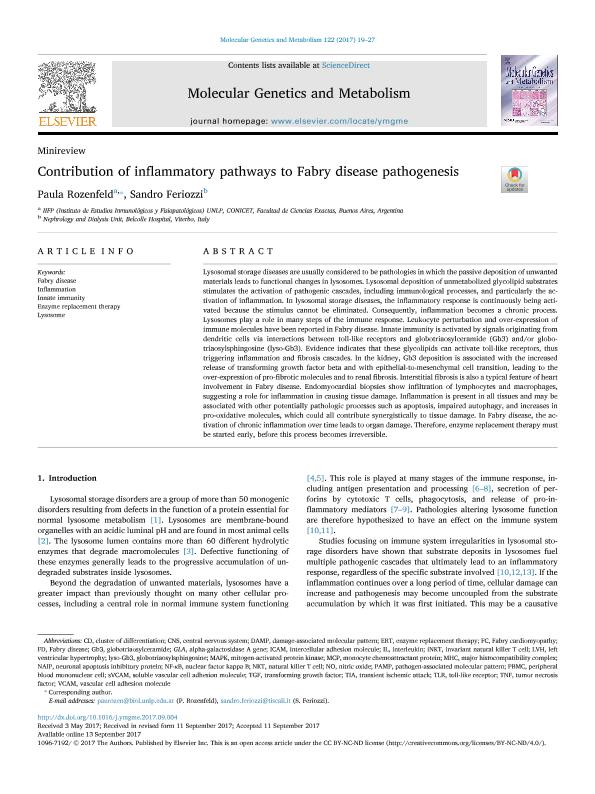Artículo
Contribution of inflammatory pathways to Fabry disease pathogenesis
Fecha de publicación:
11/2017
Editorial:
Academic Press Inc Elsevier Science
Revista:
Molecular Genetics And Metabolism
ISSN:
1096-7192
Idioma:
Inglés
Tipo de recurso:
Artículo publicado
Clasificación temática:
Resumen
Lysosomal storage diseases are usually considered to be pathologies in which the passive deposition of unwanted materials leads to functional changes in lysosomes. Lysosomal deposition of unmetabolized glycolipid substrates stimulates the activation of pathogenic cascades, including immunological processes, and particularly the activation of inflammation. In lysosomal storage diseases, the inflammatory response is continuously being activated because the stimulus cannot be eliminated. Consequently, inflammation becomes a chronic process. Lysosomes play a role in many steps of the immune response. Leukocyte perturbation and over-expression of immune molecules have been reported in Fabry disease. Innate immunity is activated by signals originating from dendritic cells via interactions between toll-like receptors and globotriaosylceramide (Gb3) and/or globotriaosylsphingosine (lyso-Gb3). Evidence indicates that these glycolipids can activate toll-like receptors, thus triggering inflammation and fibrosis cascades. In the kidney, Gb3 deposition is associated with the increased release of transforming growth factor beta and with epithelial-to-mesenchymal cell transition, leading to the over-expression of pro-fibrotic molecules and to renal fibrosis. Interstitial fibrosis is also a typical feature of heart involvement in Fabry disease. Endomyocardial biopsies show infiltration of lymphocytes and macrophages, suggesting a role for inflammation in causing tissue damage. Inflammation is present in all tissues and may be associated with other potentially pathologic processes such as apoptosis, impaired autophagy, and increases in pro-oxidative molecules, which could all contribute synergistically to tissue damage. In Fabry disease, the activation of chronic inflammation over time leads to organ damage. Therefore, enzyme replacement therapy must be started early, before this process becomes irreversible.
Archivos asociados
Licencia
Identificadores
Colecciones
Articulos(IIFP)
Articulos de INST. DE ESTUDIOS INMUNOLOGICOS Y FISIOPATOLOGICOS
Articulos de INST. DE ESTUDIOS INMUNOLOGICOS Y FISIOPATOLOGICOS
Citación
Rozenfeld, Paula Adriana; Feriozzi, Sandro; Contribution of inflammatory pathways to Fabry disease pathogenesis; Academic Press Inc Elsevier Science; Molecular Genetics And Metabolism; 122; 3; 11-2017; 19-27
Compartir
Altmétricas




